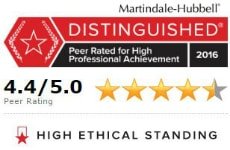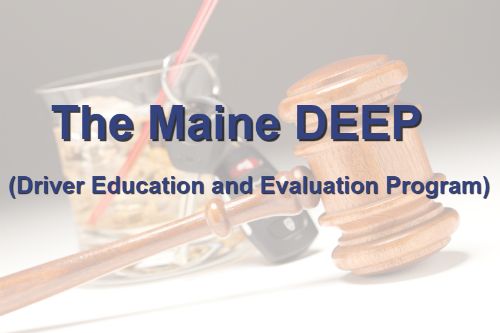The DEEP (Driver Education and Evaluation Program) is widely and wildly misunderstood and confusing for both the people charged with operating under the influence (OUI) and their attorneys. At the risk of appearing overly optimistic, I am confident that the following will de-mystify and clarify DEEP for all readers.
Rule number one: Stop distinguishing between “counseling and DEEP”. Counseling, when required, is a part of DEEP. If you can follow this rule, you are on your way to achieving a better understanding of the program. If you cannot or will not follow rule number one, you may as well stop reading now.
The DEEP office is part of The Office of Substance Abuse which is part of the larger Department of Health and Human Services. Are the “red flags” going up ? They should be at full mast. This is a bureaucratic labyrinth of often nonsensical government slop. You have to make sense of it in order to survive an OUI charge and/or effectively guide your clients through the program. Look, OUI cases are, by far and away, the most complicated criminal cases in Maine (and in all 50 states). You lawyers owe it to your clients to guide them through their three-headed OUI monster: Court, DMV and DEEP.
DEEP is a Three Step Program
Clients must pay a $300 administrative fee to get into the program. Lawyers should have a printout available for clients at the initial consultation or, at least, provide them with a link to the website. Simply advise, strongly urge, clients to call the number on the printout or website immediately to pay the fee and sign up for the earliest available “step one” class.
Step one: Step one is education (remember the acronym referenced above). Clients will be in a class of 20-25 people. This is a 20 hour lecture and breakout sessions over a three or four day format depending on which format works best. Before the lecture starts, each person must complete a “yes/no” data gathering survey regarding substance use issues. This is NOT an evaluation of any kind. It is an archaic data gathering survey and was developed as such. Nonetheless, all of these surveys will be fed into a computer in Augusta. The computer will spit out numerical scores for each client.
Circa seven to ten days following the completion of the 20 hour education sessions, The DEEP office will send each client a letter. By my estimate, 2% will receive a letter stating that he has “completed all DEEP requirements”. Get a copy of that letter from your client. Circa 98% will receive a letter from DEEP referring him to step two, an evaluation (again, refer to the acronym).
Step two: Step two is an evaluation. This is NOT treatment, this is NOT counseling. If client is referred to the evaluation step, DEEP will provide him with a few random names of clinicians in his area. Do NOT allow your client to hire that clinician unless and until you approve of that person. Client must apprise you of the results from step one and you must ensure that he schedules the evaluation with someone of whom you approve. There are unscrupulous clinicians out there who are motivated financially. You must protect your client from them.
The evaluation consists of two to four one hour sessions that may only be conducted once per week. The client will be required to sign an agreement to remain abstinent from alcohol throughout those two to four weeks. Clinicians do random urine testing to ensure compliance. The clinician will require client to bring a “relevant person” to attend one session. The relevant person can be a spouse, significant other, sibling, friend, etc.
The clinician is charged with making a diagnosis for a substance use disorder or not making such a diagnosis. These are not “shooting the breeze” sessions. The clinician is utilizing the DSM-V criteria for substance use disorder. The clinician reports the findings to DEEP. No diagnosis means no treatment recommended. Client receives a letter from DEEP stating that “you have completed all DEEP requirements. Get a copy of that letter from your client. You should also have your client get you a short letter from the clinician.
The numbers, by my estimate, flip-flop at step two. Circa 98% of clients are not diagnosed with a substance use disorder. Those whom are diagnosed must complete step three, treatment.
Step three: This step is euphemistically (rather ignorantly) called Completion of Treatment. Step three requires six to 12 one hour sessions (only one per week) of actual treatment/counseling.
ALL three steps, AS REQUIRED, are part of DEEP. There is no such thing as “I skipped DEEP and just did counseling”. There is no such thing as “I finished DEEP, I’ll do counseling later”.
For those of you still interested, I will address some practical points.
My percentages are based on several factors. All factors are dependent on client’s history. If, and only if, client has previously been diagnosed with a substance use disorder, he may call DEEP at the outset and request that he go straight to step three, treatment. Those clients may opt for an IOP or inpatient program. DEEP will mail them the appropriate paperwork to do step three only. They must ensure that the program is accepted by DEEP.
Clients are no longer able to just make a phone call to opt to go directly to six hours of treatment to avoid step one. DEEP has been threatening to attack the licensure of clinicians who accept undiagnosed clients as being analogous to doctors performing unnecessary surgery. If an undiagnosed client attempts to skip directly to step three, the clinician will take his money and then send him back to the step one education sessions before submitting anything to DEEP.
Out of state clients may no longer do the traditional out of state DEEP program (that was the equivalent of skipping directly to step three). DEEP will require that client to come to Maine to complete step one. Out of state clients are best-advised to do their own state programs and be advised to have their state program send proof of completion to The DEEP office. There are exceptions. Massachusetts and New Hampshire have extremely long and difficult programs. Those clients should be advised to do the DEEP program in Maine or to, at least, come here to do step one and, if necessary, do step two (three if required with an LSAC in their home state– DEEP will provide the paperwork).
Clients, especially first offenders, must be advised, strongly urged, to get DEEP done asap. My folks sign up for step one within 24 hours of meeting with me. I realize that this is impossible on court-appointed cases, but, hopefully, the point is not lost for all situations. Do NOT advise clients that “it’s okay to wait to see what happens” . It is not. First offenders who submit to a chemical test receive a 150 day suspension from DMV well before their first court date. If they lose their DMV hearing, they can be fully restored in 30 days with the ignition interlock device (IID). They are eligible for the IID after 30 days ONLY if they have paid their reinstatement fees (they should be advised to do so immediately upon receipt of the notice of suspension) AND COMPLETED DEEP. The same IID rules apply for all clients regardless of whether a second offense (three year suspension, IID eligible after nine months for example) or third offense (six year suspension, IID eligible after three years).
If you are serious about effectively representing clients in OUI cases, you must understand and explain the DEEP program. This is often the most difficult, confusing and frustrating monster of the three-headed beast that constitutes an OUI case. Advise and apprise each client about the foregoing. Court is the easiest part, the simplest monster with which clients must deal procedurally. DMV is second. DEEP can be the worst. Lawyers can make it easy.
Related Content: DEEP Service Providers
Disclaimer: This article is intended to provide general, not specific, information about Maine law. The publication of this article does not constitute an attorney-client relationship between the author(s) and the reader(s).





